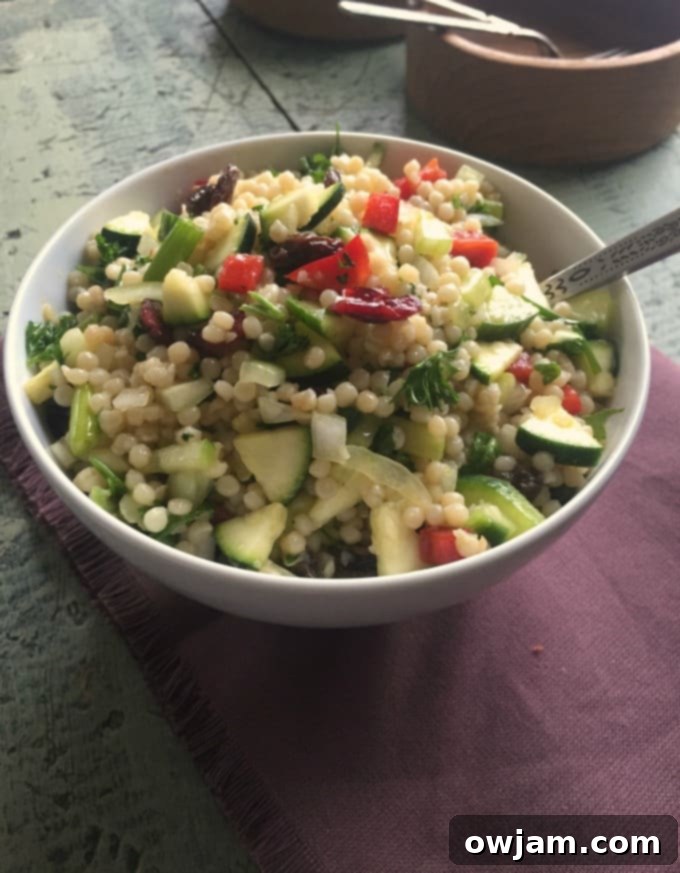Delicious Israeli Couscous Salad with Zesty Lemon Dressing: Your Ultimate Make-Ahead Meal
Bright, refreshing, and incredibly versatile, this Israeli Couscous Salad with Lemon Dressing is more than just a side dish—it’s a culinary masterpiece ready to elevate any meal. Whether you’re planning a casual dinner, a wholesome lunch, or a vibrant summer BBQ or picnic, this salad is your perfect companion. It beautifully combines warm, fluffy couscous with a colorful medley of crisp vegetables, sweet dried cranberries and raisins, all brought together by a light and zesty lemon dressing. The best part? It’s a fantastic make-ahead option, meaning you can prepare it in advance and enjoy its delightful flavors whenever hunger strikes.
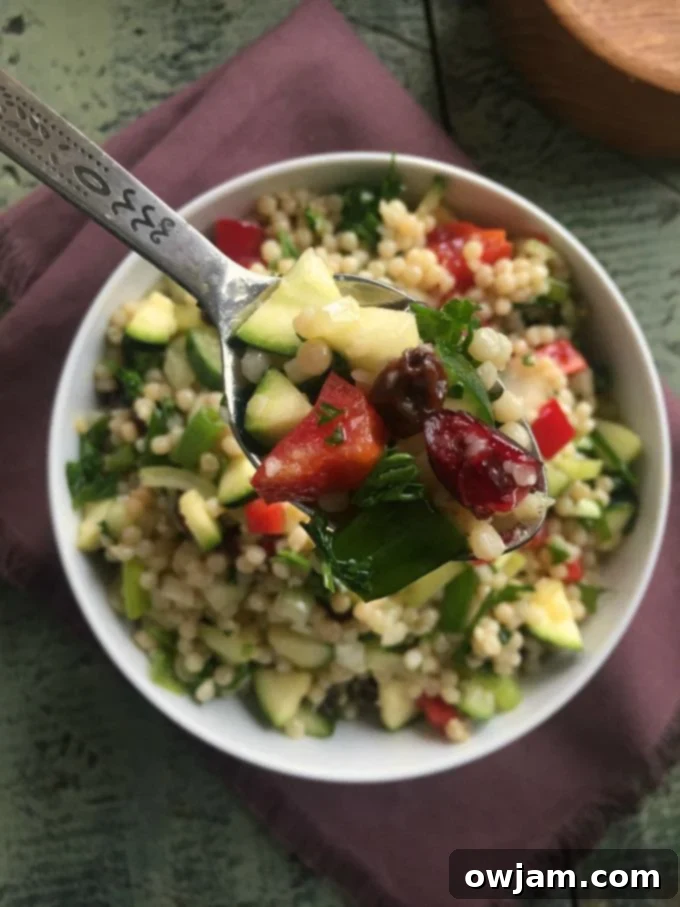
My culinary journey recently led me to rediscover the wonderful world of couscous, especially for side dishes and salads. For a while, it seemed to have slipped off my regular cooking radar, with rice and orzo taking center stage in my meal preparations. However, bringing couscous back into my kitchen has been a revelation! It truly makes a fantastic base for salads, offering a unique texture that’s both satisfying and light. An unexpected, yet delightful bonus, is how much my kids have taken to it, eagerly devouring every bite.
The inspiration for this particular Israeli Couscous Salad with Lemon Dressing struck during a memorable lunch date with Drew and our friend Mike a few weeks ago. The restaurant we visited served an exceptional Israeli Couscous Salad, brimming with fresh vegetables and sweet dried fruits. I was instantly captivated by its vibrant flavors and delightful combination of ingredients, and Drew shared my enthusiasm. This culinary experience immediately earned a spot on my ever-growing “recipes to try” list, and I couldn’t wait to recreate its magic at home.
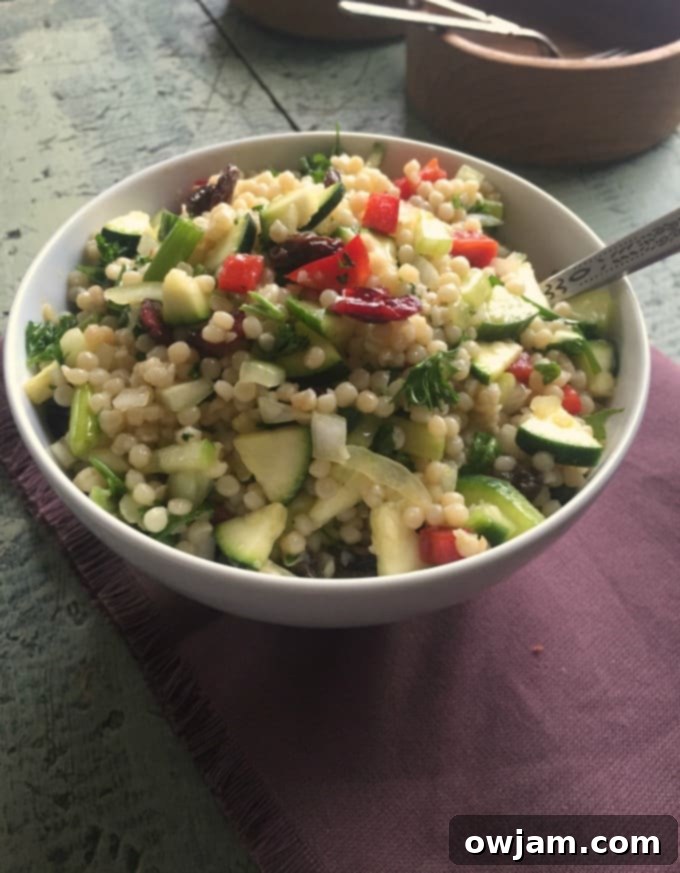
Once I perfected this recipe, a flood of ideas for variations using Israeli couscous began to emerge. The possibilities truly seem endless when it comes to combining different vegetables, incorporating various cheeses or nuts, and experimenting with diverse dressings. You can expect to see more of these exciting couscous-based salad recipes gracing my blog soon, as I am officially on a delightful “couscous kick”!
IS COUSCOUS GOOD FOR YOU? Exploring the Nutritional Benefits
Beyond its delicious taste and versatility, couscous offers a range of nutritional benefits that make it a healthy addition to your diet. Couscous, primarily made from semolina (durum wheat), is a carbohydrate-rich food that provides sustained energy. It boasts good levels of dietary fiber, which is crucial for digestive health, promoting regularity, and helping to maintain stable blood sugar levels. Furthermore, couscous is a source of plant-based protein, making it an excellent option for vegetarians and vegans looking to boost their protein intake.
With very little fat, couscous is a lean grain choice. It also contains several important micronutrients, including iron, which is vital for oxygen transport in the blood; zinc, essential for immune function and cell growth; calcium, important for bone health; and B vitamins, which play a key role in energy metabolism. Some varieties, especially whole wheat couscous, will offer an even higher fiber content, further enhancing its health benefits. It’s a staple in many healthy recipes, like these savory Mediterranean Tuna Couscous Stuffed Peppers, the refreshing Lemon Herb Couscous, the vibrant Mediterranean Grilled Vegetable Couscous Salad, or the unique Kale Couscous Pomegranate Salad. And, of course, this very Israeli Couscous Salad with Lemon Dressing perfectly showcases its healthy potential.
WHAT IS THE DIFFERENCE BETWEEN COUSCOUS AND ISRAELI COUSCOUS? Understanding the Varieties
While both are called “couscous,” there’s a distinct difference between traditional (Moroccan) couscous and Israeli couscous, also widely known as pearl couscous or ptitim. The primary distinction lies in their size and texture, which significantly influences their culinary applications.
- Traditional (Moroccan) Couscous: This is the smallest variety, typically made from semolina flour and water, then steamed. Its grains are very fine and light, almost like a tiny pasta. It cooks incredibly quickly and is best suited for absorbing sauces, serving as a light side dish, or as a base for stews and tagines where its delicate texture complements rich flavors.
- Israeli Couscous (Pearl Couscous/Ptitim): This variety is larger, resembling small pearls, and is made from toasted semolina flour. It was developed in Israel in the 1950s as a rice substitute. The toasting process gives it a slightly nutty flavor and a chewier, more substantial texture than regular couscous. Because of its larger size and firmer bite, Israeli couscous holds up exceptionally well in salads, making it ideal for dishes where you want a distinct grain texture alongside vegetables and other ingredients.
For this salad, I personally favor pearl couscous. Its delightful chewiness provides a satisfying contrast to the crisp vegetables and dried fruits. The smaller, more delicate couscous, in my opinion, is better reserved for simpler side dishes where it can truly shine without being overshadowed by too many mixed-in ingredients. Understanding this difference will help you choose the right type for your desired dish and texture.
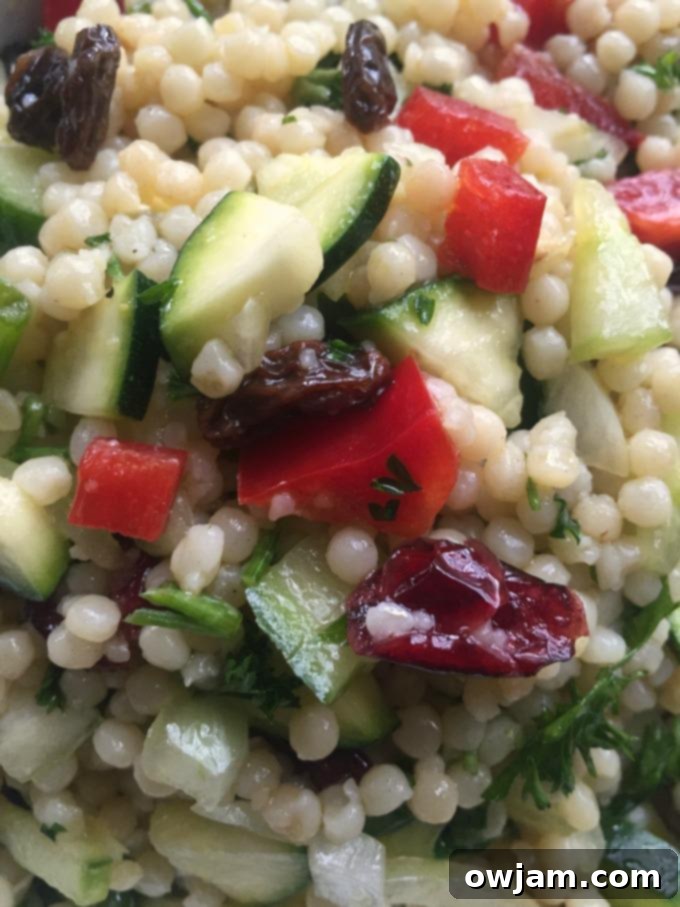
While Israeli Couscous Salad with Lemon Dressing is typically enjoyed as a warm salad, it’s equally delicious when refrigerated and served chilled, making it incredibly versatile for meal prepping. I find that adding the freshly cooked, still-warm couscous directly to the chopped vegetables and dried fruits is a key step. The residual warmth from the couscous gently softens the vegetables and plumps up the dried cranberries and raisins, enhancing their flavors and textures. The pearl couscous provides a wonderful chewiness that perfectly complements the crispness of the cucumber, zucchini, red pepper, and sweet onion. The sweetness from the dried cranberries and raisins adds a delightful counterpoint, creating a beautifully balanced flavor profile.
The addition of fresh parsley and mint, combined with the bright and tangy lemon dressing, infuses the salad with a vibrant, aromatic freshness that is both light and incredibly flavorful. I often prepare a generous batch of this salad, which then serves as a quick and healthy lunch throughout the week or as a delightful side dish for various dinners. Drew is also a big fan, which makes this Mama very happy, knowing he’s getting a hearty dose of fresh vegetables, aromatic herbs, and if I opt for whole wheat couscous, a boost of beneficial whole grains. It’s a win-win for everyone!
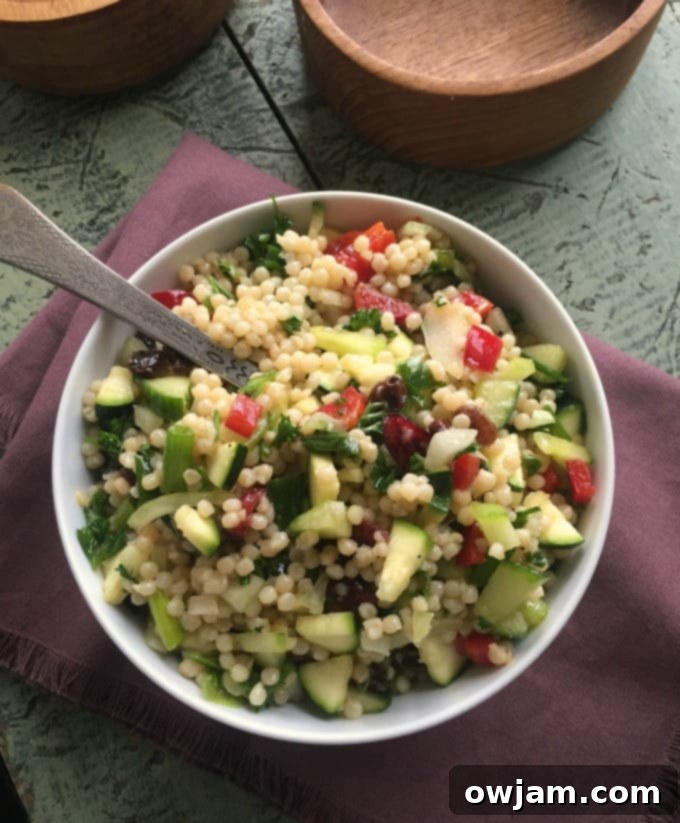
HOW CAN I MODIFY THIS MEDITERRANEAN COUSCOUS SALAD RECIPE? Endless Customization Ideas!
One of the greatest aspects of this Israeli Couscous Salad is its incredible adaptability. Feel free to use this recipe as a canvas and paint your own culinary masterpiece with these modification ideas:
BEANS: Adding legumes is a fantastic way to boost protein and fiber. I often include chickpeas for their satisfying texture and earthy flavor, but don’t hesitate to experiment! Cannellini beans, black beans, or even edamame would add a delightful twist and make the salad even more substantial.
VEGETABLES: The beauty of this salad lies in its vibrant vegetable medley. You can truly add any vegetables you love or have on hand. Consider finely diced carrots for a touch of sweetness and crunch, celery for a refreshing bite, bell peppers of different colors for visual appeal and varied flavor notes, or even roasted mushrooms for an umami depth. Seasonal vegetables like asparagus in spring or cherry tomatoes in summer are also fantastic additions. For an extra boost of nutrition, try adding finely chopped kale or spinach.
GREENS: While the recipe itself is packed with fresh ingredients, incorporating leafy greens can add another layer of flavor and texture. Arugula, with its peppery kick, is one of my favorites for salads, bringing a lovely zing. If arugula isn’t your preference, consider mixing in tender spinach, thinly sliced kale (massaged with a little dressing to soften), or even Swiss chard for a slightly bitter note that balances the other flavors.
CHEESE: No Mediterranean-inspired salad in my household feels complete without a generous crumble of feta cheese – it’s my absolute go-to for its salty, tangy punch! However, this salad would also be phenomenal with creamy goat cheese for a touch of richness, small mozzarella balls (bocconcini) for a mild, milky flavor, or grated Parmesan cheese for an Italian twist. You could even try a sprinkle of halloumi, pan-fried and added warm.
PROTEIN: To transform this delightful side into a hearty main course, incorporate your favorite protein. Grilled chicken or steak, sliced thin, would be excellent. For seafood lovers, pan-seared shrimp, flaky salmon, or even canned tuna (packed in olive oil) would make a wonderful addition. Hard-boiled eggs, crumbled tempeh, or baked tofu are also great plant-based protein options that would complement the salad’s flavors beautifully.
NUTS & SEEDS: For an added crunch and nutty flavor, toasted pine nuts are a classic Mediterranean choice. You could also try slivered almonds, sunflower seeds, or even pepitas. These add healthy fats and a satisfying texture.
HERBS & SPICES: Beyond mint and parsley, feel free to experiment with other fresh herbs like dill, oregano, or basil for different aromatic notes. A pinch of ground cumin or coriander in the dressing can also add a subtle depth of flavor that complements the Mediterranean profile.
Tried this recipe? Leave a star rating and comment below! Subscribe to my newsletter or follow me on
Facebook,
Instagram, or
Pinterest for the latest.
Israeli Couscous Salad with Lemon Dressing
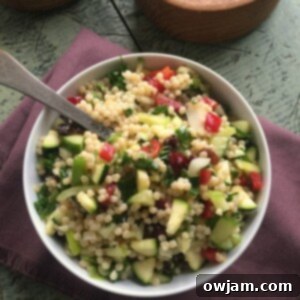
Pin
Ingredients
- 1 1/2 cup Israeli Couscous , {I bought the Trader Joes brand}
- 1 3/4 cups vegetable broth, {you can use chicken broth or water}
- 2 Tablespoons butter
- 1/2 teaspoon salt
- 1/4 cup dried cranberries
- 1/4 cup raisins
- 1 zucchini, chopped
- 4 green onions, chopped
- 1/2 english cucumber, seeds removed, chopped
- 1/4 sweet onion, chopped
- 1 red pepper, {or pepper of your choice} seeds removed and chopped
- 1/4 cup mint, freshly chopped
- 1/2 cup fresh parsley, chopped
- 1 lemon, juiced
- 1/2 cup extra virgin olive oil
- 2 garlic , minced
- Salt and pepper to taste
- parsley
- Lemon zest
Instructions
-
In a medium pot heat the butter over medium heat until melted. Add the couscous and stir until it begins to brown slightly.
-
Add the vegetable broth {or chicken broth or water} and 1/2 teaspoon salt and bring to a boil. Cover and turn down the heat to low and simmer until the liquid is gone and the couscous is tender {it took me about 9 minutes for the couscous to be done}.
-
While the couscous is cooking combine the dried cranberries, raisins zucchini, green onions, english cucumber, sweet onion, red pepper, mint and fresh parsley in a large mixing bowl and set aside.
-
In a small bowl whisk together the lemon juice, olive oil, minced garlic cloves and salt and pepper to taste and set aside.
-
Once the couscous is done cooking add it to the vegetables and mix until combined. Add the lemon dressing and stir until the couscous is fully covered in the dressing.
-
Serve warm or you can refrigerate for an hour before serving and garnish with more fresh parsley and lemon zest {optional}.
-
Store in an airtight container.
Notes
- The cook time and the amount of liquid may vary depending on the Israeli couscous you buy so make sure to read the package.
- I like to add the couscous to the vegetables when it is warm because it helps to slightly soften the vegetables and the dried cranberries.
- Other ideas to add: Chopped tomatoes or cherry tomatoes, feta cheese, pine nuts or other nuts, goat cheese, fresh basil
Nutrition
Nutrition information is automatically calculated, so should only be used as an approximation.
